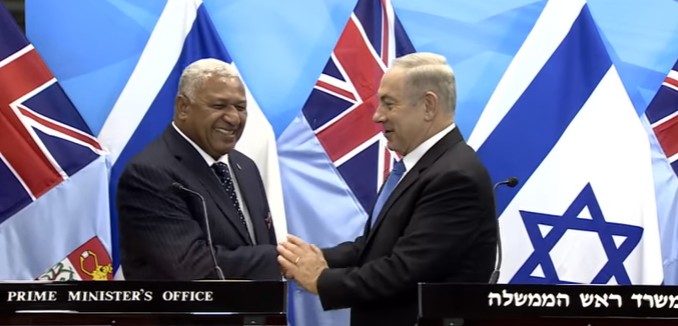Describing it as one more step in dismantling the “the automatic majority against Israel in the UN,” Israeli Prime Minister Benjamin Netanyahu announced Tuesday that he would be visiting the South Pacific island nation of Fiji early next year.
Netanyahu’s South Asian tour next February will also include Australia and Singapore. The prime minister announced two weeks ago that he would also visit Kazakhstan, Azerbaijan, and countries in West Africa next year.
“Why am I going to Fiji?” Netanyahu said in a video address to the Jewish Federations of North America’s General Assembly in Washington. “Because fifteen countries, fifteen islands that each one has a vote in the UN are coming to that meeting.”
“I’m telling you that it will be no more than a decade, and possibly a lot sooner, that the automatic majority against Israel in the UN will collapse, and Israel will actually find a fair hearing there,” Netanyahu added. “Now it’s not going to happen tomorrow. But it’ll happen, and sooner rather than later.”
South Pacific island nations are often among the only countries to vote with Israel in United Nations assemblies. For example, a vote last week to renew the mandate of a committee that investigates “Israeli practices” was opposed by only seven countries: Israel itself, the United States, Canada, Australia, the Marshall Islands, Micronesia, and Palau.
Netanyahu hosted Fijian Prime Minister Josaia Voreqe Bainimara last week and thanked him for “the sentiments of support and the actions in international forums.” In February, volunteers with the Israeli Foreign Ministry and the disaster response group IsraAID went to Fiji to provide supplies, construction equipment and assistance, and psychological counseling to survivors of Cyclone Winston, which killed 44 people and damaged or destroyed an estimated 32,000 homes.
Since 1978, the country, which has a population of 910,000 spread out across 332 islands, has provided UN peacekeeping troops in Lebanon, the Golan Heights, Egypt, and Iraq. Fijian peacekeepers serving in the Golan Heights on the Israeli border were kidnapped two years ago by the terrorist group Jabhat al-Nusra, before being released into Israeli custody two weeks later.
Israel has made significant diplomatic gains over the last year in Africa, Asia, and the Arab world. Netanyahu observed in March that “today we have diplomatic relations with 161 countries – more than at any time in our history. And by the way, there are not that many countries left. There are only about 200 countries in the world.”
Ayoob Kara, Israel’s deputy minister of regional cooperation, told Tablet in August that Israel’s “relations with our [Arab] neighbors are the best they’ve ever been,” and that while ties are often kept quiet, “we are praised by ministers and parliament members from places like Iraq, Saudi Arabia, and Morocco.”
Israeli president Reuven Rivlin is currently in India, where in a joint press conference, Indian Prime Minister Narendra Modi praised the two countries’ “strong and growing partnership.”
[Photo: IsraeliPM / YouTube ]




